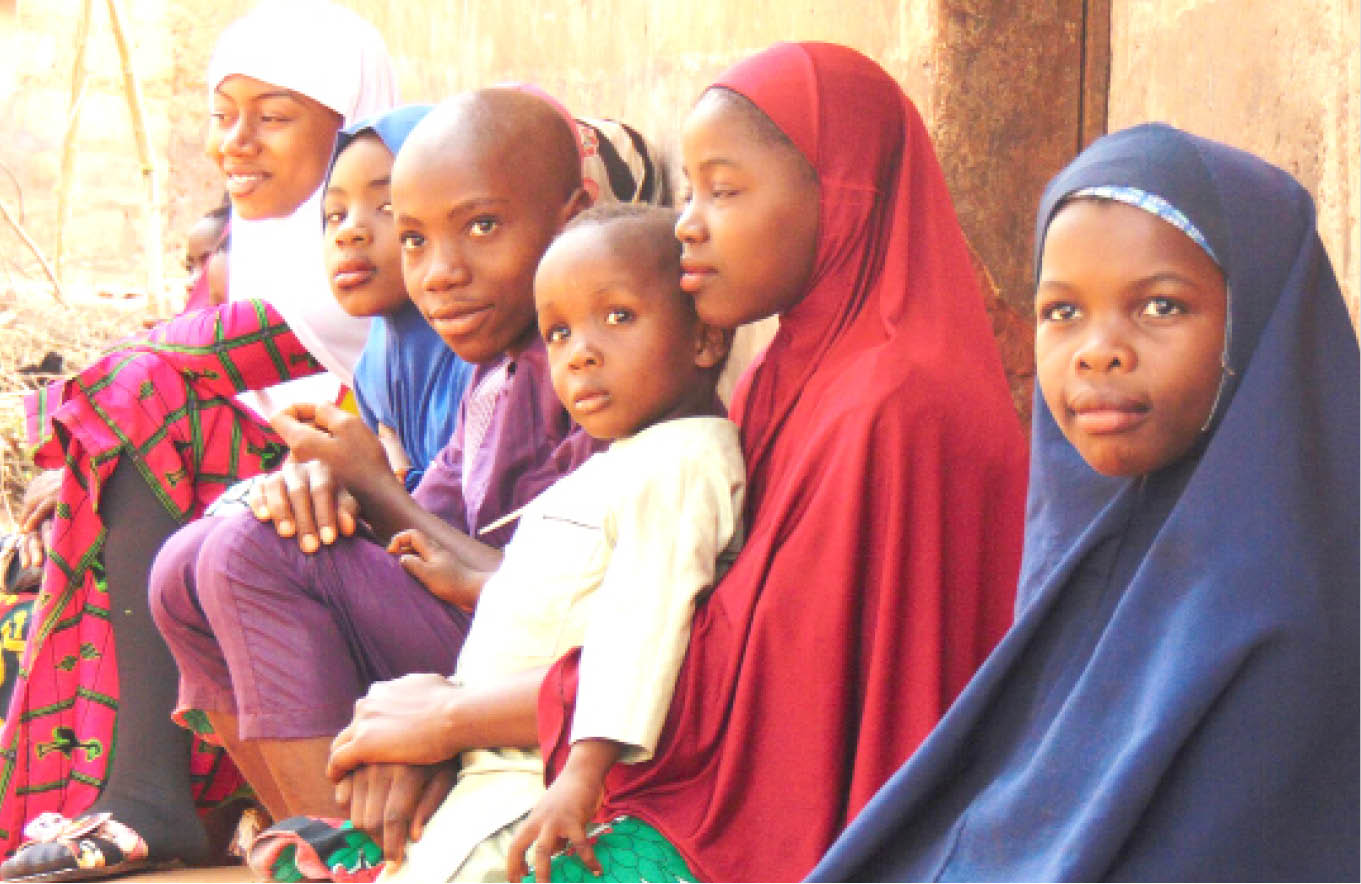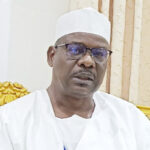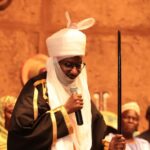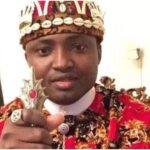Farida Okoli tells the story of her time as a sales girl in Enugu. She is not allowed to sell items while wearing hijab or with her hair tied. Okoli is pushed to lose her identity and to dress, think and intuit just like any other lady in the community.
Her words, “I have been looking for work wearing my hijab, but each time I go to an office they will tell me that I must work without the hijab. If I wear the long hijab, they will pull at it calling me a Hausa girl.”
Okoli had to change her names, rendering them less Islamic and more like an Igbo-Christian name, in order to get a job. This is another aspect of identity loss. She adds, “If I wear a head tie they will ask me to remove it.” She states that most Igbo Muslim women prefer living in Northern Nigeria, “because if you wear the hijab in the North, you will be much more comfortable than in the East.”

“When they see an Igbo Muslim, they will now say he is a Hausa man. They refuse to understand that Hausa is a tribe, Igbo is a tribe and Islam is a divine mechanism of spiritual relationship with the Almighty. They refuse to understand that we are Igbo before being Muslims, and that those in the North are Hausa before being Christians,” says Sheikh Ajah, Vice President General, (NSCIA) commenting on the use of Hausa as a method of profiling and segregating Igbo Muslims.
“If they see an Igbo Muslim, they feel he has left his grandfather’s roots and decided to go to the Hausa man who they believe is an enemy of the Igbo man. They know that we exist, but they want to give it a different interpretation,” Ajah concludes. They are referred to as Hausa and very soon they actually go to settle in the North.
More Igbo Muslims in North
Imam Njoku says, “Because of persecution in the South East, the North has risen to become home to many Igbo Muslims. There is a high level of migration to the North, and there are more Igbo Muslims in the North than in the entire South East.” He adds, “Some of our brothers, no matter how highly educated they may be, may not be considered for jobs here in the East. This is because when employers see a Muslim name such as mine, which is Suleiman Njoku, they will ask what is the link between Suleiman and Njoku. They will inquire if this is a Hausa man and proceed to ask where does he come from. This is the belief system that confronts us every day.”
Hausa phobia
All Muslims in the East are Hausa, sounds like flawed thinking, but the notion is everywhere and it is fast spreading. “The Ndigbo have the notion that it’s only Hausa that can be Muslims. An Igbo man will see a Yoruba Muslim and call him a Hausa man. He will see his fellow Igbo who is a Muslim and refer to him as a Hausa man. He will see other non-Hausa Muslims and describe them as Hausa. Somebody will even ask you, “How much are you being paid for being a Muslim?”, explains Sheikh Ali Ukiwo, Chief Imam of Abia State.
Incomplete Igbo man
The youths have amazing experiences too. Anas Abdullah Odunachukwu is studying petroleum chemistry at the University of Maiduguri, Borno State. On why he chose to apply to a university in the North rather than in Enugu, his state of origin, he replies, “The problem with applying to a university in the South East is that as soon as they see your names, they will feel you are not Igbo, or they will feel you are not a complete Igbo person. They don’t accept the fact that Igbo can be Muslims. Anas Abdullah are my Arabic names and that may discourage them.” His names imply that he will be seen as a Hausa man or a Northerner at the first instance.
The tendency to mock
“The thing that hurts is the tendency to mock, people asking you why you are a Muslim, and making the erroneous point that Islam is a Hausa religion,” adds Dr Abdulfatah Emetumah, a Muslim and the Offor of Umuofor Kingdom in Imo State.
“Their argument is based on naivety and misconception. The two main religions are from Arab lands, Christianity from Palestine, Islam from Saudi Arabia. There is a serious lack of knowledge on the part of some Christians. There are Muslims who don’t like seeing churches, and there are Muslims who can build churches for Christians. On the other hand, there are Christians who don’t like seeing mosques anywhere, and there are Christians who can help Muslims build mosques,” says Emetumah.
Memory of North
Igbo Muslims who were born in the East and schooled in the North are numerous. Saadatu Abdullahi, a Muslim of Igbo extraction who lives in Kaduna, was educated at the Federal College of Education (T) in Yobe State.
She has pleasant memories of her time: “There was no discrimination of any kind. I have never been discriminated against for not being from the North. They took cognisance of the fact that I am a Muslim, and especially of Igbo extraction. I was often given preferential treatment by both the school and the host community.”
Religion & politics
Religion may hinder rather than aid your chances during elections irrespective of the individuals gifts and talents. Ibrahim Ogbonnia Amah is the Federal Commsissioner (Representing South East) on the National Hajj Commission of Nigeria (NAHCON). He tells a curious story of his electoral misfortunes in Afikpo, his community.
“I am a practicing politician and I started politics in 1999. I contested for councillorship in 2003. I lost because I am a Muslim. I was the best in both the PDP and ANPP, but PDP was in power. The stakeholders met and told me that they know that I am the best, but that they cannot support me because I am a Muslim.”
He tried again: “I lost in 2007 and lost again in 2015. I applied for the House of Assembly elections, losing in the primaries. My loss was due to the matter of faith. The other aspirants and stakeholders who are into the business used religion to gain cheap popularity, to make people accept them.” In the effort to weaken his chances, he a non-Fulani, was then linked with the Fulani. His words: “They were inciting the people, saying how can they empower the Fulani, that if I am empowered it means that the Fulani will come and take over the entire place.”
‘I must prove I am Igbo’
Many ask why it is difficult to be Muslim and at the same time Igbo in Igbo land? Okonkwo opens up on the challenges faced by Igbo Muslims. “The challenge emerges from the fact that Islam is seen as a strange and foreign religion in this part of the country. Anybody that is a Muslim here will suffer an existential struggle. He will be denied on many fronts. Many say no real Igbo man can be a Muslim. Meanwhile you will be struggling to tell them that you are Igbo. If you speak Igbo to them, they will tell you that you just learnt it, but that your father can’t be Igbo.” Life keeps getting more and more complex for the Igbo Muslim.

‘They say we are Hausa’
The Igbo Muslim has many rivers to cross. Iheakaram, who is also Chairman, Abia State Muslim Pilgrims Welfare Board explains, “Our people have the belief that if you are a Muslim Igbo man, you are seen to be Hausa. We are not too bothered about this, because it is the mindset. We are Muslims but we are seen as a different species, and that is the challenge. It is rare to go to any part of the East and find a Muslim civil servant of Igbo extraction. It is very difficult throughout the South East, and it is a very bad omen. We have no other place, no other home. If you go to the Western Region, you will see Muslims and Christians being employed. In the North the same thing applies, but here in the South East, it is a very big challenge.”
Incessant attacks
Quite a number of mosques have come under attack over a number of years. “The people of the South East feel Islam is a religion of a particular ethnic group or region. The religion got to the Northern part before reaching our part of the country. Our people see it as a Hausa religion. The main problems here in Orlu are the incessant attacks. If there is a little problem in the state, community or local government, the first target will be to go to the mosque and destroy it,” explains Naseer Akubuo at the Orlu Central Mosque.
‘You caused it’
Suleiman Ukandu, Commissioner for Lands, Survey and Urban Planning, Abia State, argues for wide ranging reforms among the Igbo Muslims, which revolve around culture and identity: “The only challenge we have here initially is that, maybe based on your character, people will see you as a Hausa man. You are the person that caused it, it’s seen in the way you present yourself. If I am a Muslim and I don’t allow my immediate community to understand me. I do not understand the language of my people, and I cannot teach you Islam, based on the language of my people, why will they not think you are a Hausa man. If you open the Qur’an, the Lord made it clear that he sends not a messenger, except with the language of his people. Igbo Muslims resemble the Hausa Muslims, and that is part of the challenge we are facing here.”
Object of ridicule
Arabic as a course of study becomes the basis for mockery, exclusion and profiling, just as Hausa is used to segregate and stigmatise. “Once when I was an undergraduate, I introduced myself as a student of Arabic language to a group made up largely of Igbo youths. Somebody began to laugh at me saying I want to specialise in begging. After graduation you will become a beggar,” says Dr Iliyasu Usman, a specialist in Arabic who lectures at the Nasarawa State University, Keffi, Nasarawa State.
“From that point I knew there was a serious problem. There is much discrimination against Igbo Muslims, both at home and abroad. We are not given our rights and we are seen as objects of ridicule in the East. When you meet your brothers, they say you are a traitor, and that you are supposed to be a Christian or a pagan. You left your indigenous religion to join Islam. They always look at us as traitors, rather than as brothers. Some of our brothers were killed in our communities during the civil war on the ground that they were Muslims. Many indigenous Muslims were killed. There are many Igbo Muslims who left the East to settle in the North.”
Igbo phobia
Igbo speaking Hausa may face a peculiar type of problem when they travel to the North. Isiaka Adamu is the Chief Imam, Ogara Central Mosque, Abakaliki, Ebonyi State, and he is one of such. Adamu, who is of Hausa extraction, was born in Abakaliki.
His words: “When we go to our state in the North, they call us Igbo. They say we have come to the North with ‘Igbo sense’. Our people call us Igbo, and while resident here in the East, we are not given jobs by the local Igbo. In the North they say we behave like Igbo, and so they refer to us as Igbo. This is a big challenge for us. On the other hand when the Igbo see Igbo Muslims, they call them Hausa, which means that they don’t like Hausa.”
Emetumah: Muslim king in Imo
Though a Muslim king all the prayers uttered in his palace during ceremonies are done in the Christian fashion. He is the Grand Imam of Igbo land. Well-read and well-travelled, his knowledge of the bible is encyclopaedic. He draws easily from the Qur’an and global developments to back up his points. A visit to his palace is like being in the university all over again. There are several other Muslim kings in Imo State, Emetumah mentions.
“Even as a Muslim King, when I pray for Muslims I end it with the words ‘Through Christ Our Lord’, he says. “This is because in Islam we believe in Jesus Christ. Islam respects every religion, whether it is Judaism or Christianity. Even in a war situation Muslims are enjoined not to destroy places of worship, be it a synagogue, a church or shrine where pagans worship.”
He is very tolerant and this quality strengthens his convictions as a Muslim. If I become so strict, I may end up being accused of trying to Islamise them. So, I am very careful.”
He comments on the civil war and its link to contemporary events in Igbo land. “This war was started and headed by two Christian warlords, Gowon and Ojukwu, on account of Hausa phobia and Islamophobia in Igbo land. How it came about, I do not know. The civil war started by two Christian warlords has been turned into an Igbo Christian/Hausa Muslim war. This is wrong. 90 per cent of the infantry that fought the war were from the Middle Belt, a predominantly Christian area. This is Hausa phobia taken too far.”
In Imo State, there are two other Igbo Muslim Kings, but he is the more visible one among them. Apart from being Vice President General, Nigeria Supreme Council for Islamic Affairs, he is also Chairman Council of Traditional Rulers, Oguta, Imo State. He salutes the people over whom he rules. “I respect them for one thing. They don’t normally antagonise Muslims physically, except recently during the #EndSARS saga. There was an encouragement that people should attack Muslims.”
He returns to the theme of the civil war: “During the war, in some areas Igbo Muslims suffered, while in some areas they were protected. It all depends on environmental factors, and some cultural factors. For instance, during the war rent was collected for properties owned by Igbo in the North, and the properties were protected and monies given to the Igbo at the end of the war. However, the property of Igbo in Rivers State were labelled abandoned property.”

 Join Daily Trust WhatsApp Community For Quick Access To News and Happenings Around You.
Join Daily Trust WhatsApp Community For Quick Access To News and Happenings Around You.


